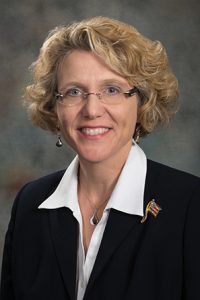Riverfront development authority proposed
A new economic development tool aimed at riverfront areas was proposed Feb. 14 in an Urban Affairs Committee hearing.

LB97, sponsored by Bellevue Sen. Sue Crawford, would adopt the Riverfront Development District Act. Crawford said the bill would provide a framework for city leaders that could be tailored to the needs of an individual municipality.
The bill mirrors a measure introduced last session, she said, and addresses concerns that were raised at the previous bill’s public hearing.
Crawford said a city would have the power, by ordinance, to decide whether to utilize the bill’s provisions as an economic development tool and decide the amount of power and resources to grant to a riverfront development district (RDD).
“This is entirely up to the city whether or not to use it,” she said. “RDDs are a tool that can be used by municipalities across the state to effectively fund, manage and promote economic development and tourism efforts on riverfronts.”
Under the bill, a metropolitan, primary or first- or second-class city could create a riverfront development district and appoint an authority of five or more members to oversee and manage the district. Two or more cities with a contiguous riverfront could enter into a joint authority.
A city would be required to set a cap on bonding and could limit an authority’s power by ordinance. In addition, an occupation or special assessment could not be imposed on the same property by both a riverfront development district and a business improvement district if the districts overlap.
Among other provisions, an authority — in conjunction with a city — would have the power to:
• fix, charge and collect rents and fees;
• invest in instruments, obligations, securities or property;
• install pedestrian shopping malls or plazas and other facilities;
• construct, install and maintain boardwalks, barges, docks and wharves;
• develop, manage and coordinate public activities and events within the district; and
• issue limited obligation bonds secured by a pledge of any revenue of the authority or by mortgage of property owned by the authority.
Josh Moenning, mayor of Norfolk, testified in support of LB97. The bill would formally recognize the state’s natural waterways, he said, which currently are an underdeveloped resource.
Norfolk’s riverfront corridor is blighted and underutilized, he said, and rural communities have few incentives for redevelopment to enhance retail, residential and recreational opportunities.
“This policy could help us grow in a positive way that strengthens sense of place, boosts regional identity and retains young people,” Moenning said.
Cassie Paben, deputy chief of staff for economic development for the city of Omaha, testified in opposition. Implementation of the bill would result in a tax increase in Omaha, she said, either through an occupation tax within the district’s boundaries or a special assessment to the property owners within the district.
“We have heard repeatedly and consistently from the citizens of our community that they do not want a tax increase,” Paben said.
Testifying in a neutral capacity, Lynn Rex of the League of Nebraska Municipalities, said all of the organization’s members that would be impacted by the bill supported it, with the exception of Omaha. While the bill is optional for cities, she said, the organization cannot testify in support without unanimous agreement from its members.
“The first and second class cities would like to have this measure move forward,” Rex said.
The committee voted 5-0 to advance the bill to general file.


